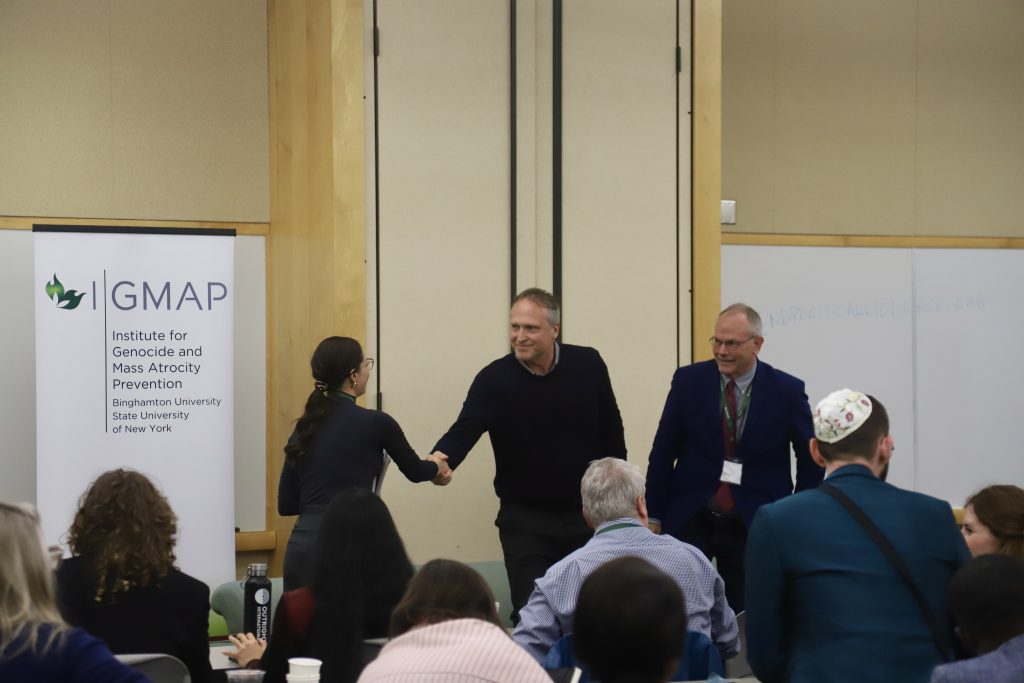The Institute of Genocide and Mass Atrocity Prevention recently hosted its annual Frontiers of Prevention conference.
The two-day event, held on Friday and Saturday, brought together 24 experts from around the world, divided into seven panels centered around atrocity prevention across different regions. Discussions focused on issues like the Sudanese Civil War, identity-based violence prevention and refugees in Kenya. One panel was titled “After the Ceasefire: Short- and Medium-Term Option for Protection and Accountability in Gaza.”
Maxim Pensky, a co-director of I-GMAP and a professor of philosophy, said the conference, first held in 2018, allows for a wide-ranging study in atrocity prevention. He said the event sought to unite what he sees as two distinct worlds: academia and government.
“One of the things that when we founded I-GMAP, we recognized there is a desperate need to get those two worlds communicating and collaborating better,” Pensky said. “And so one of the things that we really thought was: What better way to do that than bring practitioners physically here to Binghamton?”
“Instead of having a conference — a usual conference with papers and PowerPoints and that sort of thing — just have them talk and then build in lots and lots of time for us and our students to network with them, to talk with them, to pick their brains over coffee and to try to understand really one essential question — which is, what opportunities for collaboration or for cooperation are we missing? What can we do together?” he continued.
Established in 2016, I-GMAP is committed to helping the University become a leader in preventing violence like genocide, crimes against humanity and war crimes. It remains one of the only academic-based institutes in the world that focuses on preventing atrocities.
Kai Mata, an LGBTQ+ Indonesian singer-songwriter and winner of the 2024-25 Joint Annual Engaged Artivist Award on Atrocity Prevention and Human Rights, performed on the conference’s first day. The award she won recognizes artist-activists who respond to large-scale identity-based violence and mass atrocities globally.
“In my opinion, music can be the heartbeat of any social movement,” said Mata, speaking on her performance at the conference and the role of art as a tool for atrocity prevention. “It is what people chant on the streets, what people listen to in their cars, it is what people gravitate toward when they are feeling sad or happy. Every event has music in it. And how do we imbue that music with messages that can contribute to building a world where there’s more compassion, where we have more kindness and more sense of actually wanting to be a part of creating the best world possible?”
On Friday, welcoming remarks were delivered by the institute’s co-directors, Pensky and Kerry Whigham. The opening expert discussion with speakers, including Annie Bird, an instructor at the Auschwitz Institute for the Prevention of Genocide and Mass Atrocities, was followed by a panel titled “Catastrophe in Sudan: What Way Forward?” and another called “Preventing Identity-Based Violence from the Ground Up.”
More panels were held on Saturday, with one about the atrocity risks posed in the second Trump administration and another titled “Safer Havens: State-Civil Society Collaboration for Better Protection of Refugees in Kenya.” The weekend concluded with a final panel discussion, “Education and Prevention.”
On Friday evening, I-GMAP presented the Nadia Rubaii Memorial Prize, named for the late I-GMAP founding co-director, to “The Parents Circle-Families Forum,” an Israeli-Palestinian peace organization supporting families who have lost relatives in the ongoing violence. Robi Damelin and Sima Mohammed Awad, who are Israeli and Palestinian, accepted the award in recognition of their commitment to promoting human rights and prevention of mass atrocity.
Their speech, titled “Shared Grief, Shared Hope: Israelis and Palestinians for Peace,” called for an end to the violence, more tolerance and the beginning of a long-lasting peace.
Damelin, a spokesperson and director of international relations for the organization, and Awad, a Palestinian from the West Bank, shared personal stories of tragedy and loss. Damelin’s son, David, was killed by a Palestinian sniper during his service in the Israel Defense Forces, and Awad’s brother died after an outbreak of violence in 2008. Awad said her mother and Damelin connected over their shared loss and worked to move forward, with her mother realizing “that there is no Palestinian or Israeli grief” but only “mothers who lost their sons.”
Damelin described how she reacted when the Israeli military informed her that her son had been killed and how it inspired her to demand change.
“One of my first reactions was, ‘You cannot kill anybody in the name of my child,’” Damelin said. “And that was very prophetic about what I was going to do with the rest of my life, and I knew almost immediately that I wanted to do something to prevent mainly others from experiencing this pain. This is a pain that doesn’t go away. You learn to live with it next to you, and you make a choice, what will you do with that?”
“And so the Parents Circle found me because I spoke at a huge demonstration to get out of the occupied territories, and they invited me to come to a weekend in East Jerusalem to meet other bereaved families,” she continued. “And I remember sitting around the table, just almost like the table in front of me, looking into the eyes of the Palestinian mothers and recognizing that we shared the same pain and that if we together could stand on the stage and talk for reconciliation and nonviolence, then surely that would be an example for everybody.”
Editor’s Note (4/7): Because of editing errors, the cause of death for Awad’s brother was misstated. He died from injuries after an outbreak of violence.



